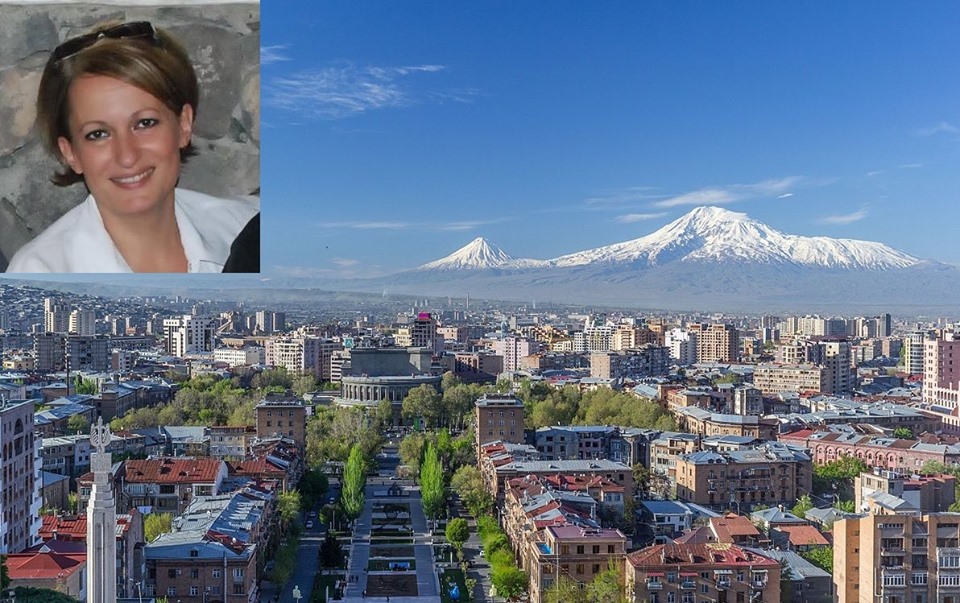EVN report editor-in-chief Maria Titizian
TorontoHye’s Interview With Editor In Chief Of EVN Report Maria Titizian
TorontoHye- Emergency situation has been declared in Armenia due to COVID 19 pandemic. Can you talk about what the emergency measures entail?
Maria Titizian- Technically, Armenia is in a State of Emergency until May 14. This entailed shutting down educational institutions, public transportation and all businesses except those considered essential – pharmacies and grocery stores. People not involved in essential services were required to self-isolate in their homes. If they had to go out, they were required to have their ID on them including a document explaining where they lived, where they were going, for what purpose and when they intended on returning to their place of residence. At the same time, inter-regional travel was being monitored and everyone needed to have a valid reason to be traveling.
However, on May 4, a number of restrictions will be lifted by the Warden of the State of Emergency (Deputy Prime Minister Tigran Avinyan). They include the following:
Transportation:
– All restrictions on people’s free movement are lifted; a written form will no longer be required;
– Public transportation will continue to be shut down;
– Restrictions on interregional transportation are lifted [they were lifted a week ago] instead certain communities can be placed under temporary lockdown depending on the spread of the virus or if the community becomes an infection hub.
Economic Activity:
In addition to the spheres already permitted to operate, restrictions on the following spheres will also be lifted
– Production of textile, shoes, furniture, printing;
– Work on completion of construction projects;
– Wholesale and retail trade, but only in specialized and non-specialized stores and kiosks. Shopping malls and markets will remain closed. Only food, agricultural outlets and pharmacies can operate in shopping centers;
– Open air cafes, restaurants and pubs;
– Information and communication sector;
– Zoos, botanical gardens and natural reserves;
– Sports clubs and sports facilities exclusively for professional athletes to train and hold sporting events;
– Personal services: washing, cleaning and dry-cleaning services, hairdressing salons, beauty parlors.
There are mandatory rules for the organization of activities for each of the domains, non-compliance with which will lead to applicable fines and measures prescribed by law. At the same time, supervision over the observance of the rules will be strengthened.
In a message to the people, Avinyan also said that the decision to ease restrictions does not mean the danger of the pandemic is behind us, but rather this is an attempt to establish new rules of coexistence. He also said that at this stage, individual, social and corporate responsibility is of utmost importance and that this is a test to see to what extent people are capable of discipline and social awareness and responsibility. He noted that if the situation worsens, there will be a return to stricter restrictions.
T- How are the people adapting to this? Are there any concerns on this front?
M.T.- Unfortunately, not everyone was following the regulations of self-isolation, nor were they properly protecting themselves, their families and communities. It appeared that in the regions of the country, in many towns and villages, life was going on as usual. The notion of social responsibility, social distancing, self-isolation among the population was not very high and this is the reason why we have seen a continual rise in the number of infections.
T- The number of infections is increasing every week. The Minister of Health Arsen Torosyan gave a worst-case projection that his Ministry is preparing for. Is your perception that the pandemic is moving towards these projections, or are the measures taking effect to reduce the infection numbers?
M.T.- I think we are nearing a worse-case scenario. Presently, anyone who has tested positive for COVID-19 is immediately hospitalized in those medical institutions that have been designated by the Health Ministry to deal solely with COVID-19 patients, even if they are asymptomatic. Anyone who has come into direct contact with a COVID-19 patient, is automatically placed in quarantine in different locations throughout the country for a period of 14 days and are released after double testing to ensure they have not been infected. Minister of Health Torosyan said that if numbers continue to rise (which they have significantly over the last several days), the government will not be able to keep COVID-19-positive patients who are asymptomatic in hospital and will be required to send these people home to recover from the infection.
As of May 3, 24,177 tests have been conducted throughout the country, there are 2386 people infected, 1035 recoveries, meaning that there are 1312 active cases. All of these people are currently hospitalized, however, in a few days, we might be reaching the peak. Also, there are a total of 35 deaths associated with COVID-19 since the first case was registered back on March 1.
T- Do you think that the government’s policies trying to contain the pandemic are enough? Or do you see gaps in the policies or in their implementation.
M.T.- I think that the government, in particular the Ministry of Health, has done everything possible with its very limited resources to try and stem the transmission of the virus. As I mentioned earlier, they are hospitalizing everyone who has tested positive (no one at this point has been sent home to “ride it out”) and thousands of people who have come into contact are quarantined and these expenses are being paid for by the government. Passengers on flights bringing Armenian citizens back to Armenia, are automatically being placed in a 14-day quarantine, again, paid for by the government. Also, through a number of campaigns (TV, social media), the Ministry has been very clear in its messaging, urging people to follow regulations. Additionally, the State Commission of the State of Emergency has been monitoring those essential businesses that were allowed to stay open to ensure they are following the regulations set by them – disinfecting their premises, making sure staff wear masks and gloves, ensuring customers maintain social distancing, etc. Any businesses found in violation of those regulations were forced to temporarily shut down and forced to adhere to the rules. The Ministry of Education, Science, Sport and Culture immediately went into action to ensure that the school year would not be compromised and helped schools’ transition to online learning. Taking into consideration the levels of poverty and lack of access to the Internet and devices for many children, the Ministry worked with Armenia’s Public Television to air lessons on TV so that no child would be left behind. They also launched a drive to get as many computers and smartphones to those children and a number of organizations and individuals donated them. Unfortunately, it was not enough to make sure each child had access, but they did try as best they could to address the situation.
The Office of the High Commissioner for Diaspora Affairs has been actively working, coordinating and collaborating with Diaspora Armenian medical professionals all over the world to help the Ministry of Health in dealing with the pandemic.
The Ministry of Foreign Affairs and the Republic of Armenia’s diplomatic missions around the world have been working diligently to find ways to bring all those Armenian citizens who wish to return to Armenia. Several thousand Armenian citizens have returned thanks to their efforts.
T- The crisis has already affected the already struggling economic situation in the country. What type of support is the government allocating to businesses and individuals?
M.T.- To date, the government has rolled out 15 economic assistance packages for SMEs (small- and medium-sized businesses) impacted by the shutdown, registered workers who lost their jobs, families with children under the age of 14, pregnant women, agricultural workers, service industry workers, assistance to partially cover student tuition fees and subsidies for utility payments for all citizens. You can find more information about the first nine assistance packages here: https://www.evnreport.com/covid-19/covid-19-daily-briefing-april-9
Unfortunately, the impact of the economic fallout is already adversely affecting thousands of families across the country and it’s difficult to predict at this point, when and how Armenia’s economy can recover from this devastating blow.

